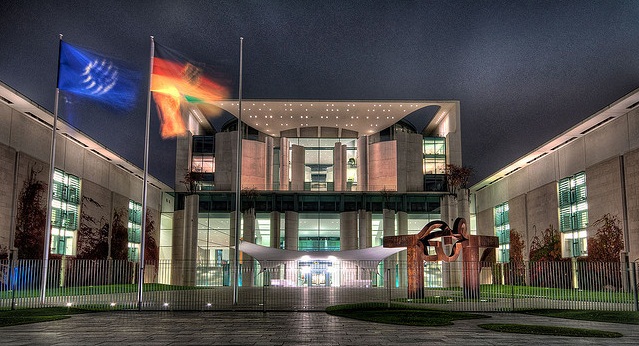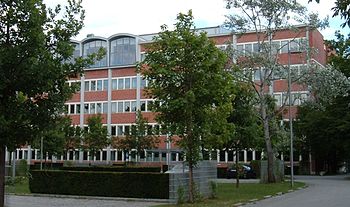German Federal Government Strongly Advocates Munich as Seat of Central Divison of EU Unified Patent Court
In one of our latest postings on the legal and political shadows of the Unified Patent Court Agreement we concluded that the stuck ‘seat issue’ will now have to be decided on the top executive level, i.e. in personal talks between Federal Chancellor Angela Merkel, Prime Minister David Cameron, and - should he survive the French presidential election in April/May 2012 - Nicolas Sarkozy as the only serious and realistic bits were Berlin, London, and Paris, respectively.
While the German government always claimed the seat of a European Patent Court, should such court ever exist, London became a candidate rather late and only after intervention of the UK legal profession and Paris was considered a compromise location to prevent a deadlock between Munich and London. None of these bits is ideal for everyone as each has considerable drawbacks, as has been recently summarised on FT.com “few other EU countries are happy with a Munich seat because the city is already the home to EPO“, “Britain lacks goodwill or allies“, and “French inflexibility has been damaging“.
As German Chancellor Angela Merkel – probably being at the climax of her political power – has recently made clear that she is “unwilling to drop her demands” given the fact that Germany is the strongest EU economy and the largest patent filing EU state, EU diplomats assume in the meantime that David Cameron is simply pushing the price up but does not have a realistic chance to succeed given Great Britain’s general EU scepticism and weak position within the Union.
Now my colleague and fellow blogger Axel Horns has found further evidence for the German determination to bring the court to Munich, where it might move into the premises of the Federal Patent Court (BPatG), whose current users are likely to lose many cases to the new EU Patent Court, should it ever become reality. The impressive neo-barock Justizpalast of Munich (in which, by the way, the members of the White Rose were sentenced in 1943) might, however, not be available.
While the federal government has emphasised the idea of a German court location for many years and France has its own ambitions, the objectives and fortitude of the British Government remain unclear, even though the public debate – especially in the blogosphere – positioned London as a favourite candidate. From a more realistic point of view, the recent EU skeptic policy of Her Majesty’s Government under PM Cameron might have significantly reduced London’s chances to win the race.
Before this background, a recent written parliamentary question of Doris Barnett (Social Democrats), Member of the German Parliament (Bundestag), gave the Federal Government the opportunity to take a public position on this issue. Question 50 of the Drucksache 17/8723 (in Germany) reads:
[W]hat are the efforts undertaken by the Federal Government in order to take care that in the case of a creation of the European Patent Court the seat [of the Central Division] will be located in Germany?
Dr Max Stadler, Parliamentary State Secretary to the Federal Minister of Justice under Minster Sabine Leutheusser-Schnarrenberger (both Liberals), answered the question as follows (cf. Plenarprotokoll 17/161, page 1919 onwards; in German):
[...] The Federal Government strongly advocates in the negotiations that the seat of the Central Division will be in Munich. As the European capital city of patents Munich is best suited for the headquarters of the Patent Court. The European Patent Office, which will grant EU patents, has its headquarters here. The required technical skills of judges and attorneys/lawyers are available here in particular. France has also applied for the seat (Paris). The overall agreement largely depends on the seat of the Central Division. The Federal Government will continue on all levels to advocate Munich as the seat of the Central Division.
The decentralized structure of the Court provides that patent infringement cases are brought before Local or Regional Division residing in the Member States. It can be taken for granted that the Local Divisions located in Germany will have a significant proportion of the total volume of litigations.
What is interesting is that Max Stadler who represents Germany in the negotiations and should really know about the process only mentioned Paris and completely left aside the London bit.
That might be a strong indication that London does not have the best chances to succeed. Some reasons for London’s weak position have been given here:
The UK has done very little of the heavy lifting during the EU patent talks, preferring to leave it to France, Germany and a succession of EU presidencies. Politically, the UK is also more detached from the EU mainstream than ever. I just cannot see how we can expect the rest of Europe to take our claims for the court seriously – especially as we are not a part of the Eurozone [...].
In any case, an agreement on the Court location is not to be expected before the French general elections in April/may this year, while the EU Council expressed in an official statement his believe that a final agreement can be reached in June 2012 at the latest.
As Angela Merkel strongly supports Nicolas Sarkozy’s election campaign (which earned her critisism in Germany) it is an imaginable option that a President-elect Sarkozy will thank Angela Merkel’s help by agreeing on Munich. Given the current opinion polls, however, it appears to be the far more likely option that Europe will have to learn François Hollande‘s ideas about the Unified Patent Court system.
(Photos 2009 by Sebastian Niedlich via Flickr under a CC license and 2006 via Wikimedia under a GNU license)
Volker 'Falk' Metzler
European Patent Attorney, German 'Patentanwalt', European Trademark and Design Attorney, Computer Scientist, PhD, IP Blogger, Father of Two, Mountain Enthusiast
One Response to German Federal Government Strongly Advocates Munich as Seat of Central Divison of EU Unified Patent Court
The k/s/n/h::law blog
Some of the patent attorneys of the KSNH law firm have joined their efforts to research what is going on in the various branches of IP law and practice in order to keep themselves, their clients as well as interested circles of the public up to date. This blog is intended to present results of such efforts to a wider public.
Blog Archives
- November 2013 (2)
- October 2013 (1)
- September 2013 (1)
- August 2013 (2)
- July 2013 (3)
- June 2013 (5)
- March 2013 (5)
- February 2013 (4)
- January 2013 (5)
- December 2012 (5)
- November 2012 (5)
- July 2012 (5)
- June 2012 (8)
- May 2012 (5)
- April 2012 (3)
- March 2012 (4)
- February 2012 (5)
- January 2012 (6)
- December 2011 (12)
- November 2011 (9)
- October 2011 (9)
- September 2011 (4)
- August 2011 (7)
- July 2011 (4)
- June 2011 (1)
Blog Categories
- business methods (6)
- EPC (7)
- EPO (12)
- EU law (92)
- ACTA (8)
- CJEU (4)
- Comitology (1)
- competition law (2)
- Enforcement (6)
- EU Unified Patent Court (62)
- FTA India (1)
- TFEU (2)
- Trade Marks (5)
- European Patent Law (37)
- German Patent ACt (PatG) (1)
- German patent law (5)
- Germany (6)
- Pirate Party (3)
- International Patent Law (4)
- PCT (2)
- IP politics (10)
- licenses (2)
- Litigation (5)
- Patentability (7)
- Patents (12)
- Piratenpartei (2)
- Software inventions (10)
- Uncategorized (9)
- Unitary Patent (24)
- US Patent Law (4)
Comments
- kelle on Germany: Copyright Protection More Easily Available For Works Of “Applied Arts”
- Time Limits & Deadlines in Draft UPCA RoP: Counting The Days - KSNH Law - Intangible.Me on Wiki Edition of Agreement on Unified Patent Court Agreement (UPCA)
- Time Limits & Deadlines in Draft UPCA RoP: Counting The Days | ksnh::law on Wiki Edition of Agreement on Unified Patent Court Agreement (UPCA)
- Wiki Edition of Agreement on Unified Patent Cou... on Wiki Edition of Agreement on Unified Patent Court Agreement (UPCA)
- European Commission Takes Next Step Towards Legalising Software Patents in Europe | Techrights on EU Commission publishes Proposal of amendend Brussels I Regulation for ensuring Enforcement of UPC Judgements
Blogroll
- 12:01 Tuesday
- America-Israel Patent Law
- Anticipate This!
- AwakenIP
- BlawgIT
- BLOG@IPJUR.COM
- BP/G Radio Intellectual Property Podcast
- Broken Symmetry
- Class 46
- Director's Forum: David Kappos' Public Blog
- Gray on Claims
- I/P UPDATES
- IAM Magazine Blog
- Intellectual Property Intelligence Blog
- IP Asset Maximizer Blog
- IP CloseUp
- IP Dragon
- IP Watch
- IP Watchdog
- IPBIZ
- ipeg
- IPKat
- ITC 337 Law Blog
- Just a Patent Examiner
- K's Law
- MISSION INTANGIBLE
- Patent Baristas
- Patent Circle
- Patent Docs
- Patently Rubbish
- PatentlyO
- Patents Post-Grant
- Reexamination Alert
- SPICY IP
- Tangible IP
- The 271 Patent Blog
- The Intangible Economy
- THE INVENT BLOG®
- Think IP Strategy
- Tufty the Cat
- Visae Patentes
The KSNH blogging landscape


This blog and the German-language sister blog k/s/n/h::jur link to the two popular and privately run blogs IPJur und VisaePatentes and continue their work and mission with a widened scope and under the aegis of our IP law firm.
ksnhlaw on Twitter
- No public Twitter messages.
 KSNH::JUR Feed (german)
KSNH::JUR Feed (german)- Ist Verschlüsselung passé? September 6, 2013Auf verschiedenen Feldern beruflicher Praxis ist dafür zu sorgen, dass Kommunikation vertraulich bleibt. Die trifft beispielsweise für Ärzte zu, aber auch für Anwälte, darunter auch Patentanwälte. Einer der zahlreichen Aspekte, die in diesem Zusammenhang eine Rolle spielen, ist die Technik, um die Vertraulichkeit beruflicher Kommunikation sicherzustellen. Wa […]
- EU-Einheitspatent: Demonstrativer Optimismus und Zahlenmystik allerorten – Naivität oder politische Beeinflussung? June 26, 2013Nach mehreren vergeblichen Anläufen zur Schaffung eines EU-weiten Patentsystems wurde 1973 als Kompromiss das Europäische Patentübereinkommen unterzeichnet, welches unabhängig von der seinerzeit noch EWG genannten Europäischen Union System zur zentralisierten Patenterteilung mit nachgeordnetem Einspruchsverfahren durch das Europäische Patentamt schuf. Wie wi […]
- Moderne Zeiten oder: DPMA und Patentgericht streiten über die elektronische Akte April 25, 2013Bekanntlich hat das Deutsche Patent- und Markenamt (DPMA) im Jahre 2013 mit der rein technischen Fertigstellung der Einrichtungen zur elektronischen Akteneinsicht einen wichtigen Meilenstein seines Überganges von der Papierakte zur “elektronischen Akte” erreicht. Im DPMA werden aber bereits seit dem 01. Juni 2011 Patente, Gebrauchsmuster, Topografien und erg […]
- Gutachten zu Forschung, Innovation und technologischer Leistungsfähigkeit Deutschlands 2013 March 11, 2013Unter dem Datum vom 28. Februar 2013 ist die Bundestags-Drucksache 17/12611 veröffentlicht worden Sie trägt den Titel Unterrichtung durch die Bundesregierung - Gutachten zu Forschung, Innovation und technologischer Leistungsfähigkeit Deutschlands 2013. Die Bundesregierung legt dem Deutschen Bundestag seit dem Jahr 2008 […]
- 3D-Printing: Zum Filesharing von 3D-Modelldaten February 25, 2013In meiner kleinen zuvor angekündigten Reihe über rechtliche Aspekte des 3D Printing komme ich heute auf die Frage zu sprechen, ob die Hersteller von Gerätschaften es hinnehmen müssen, wenn Ersatztreile davon – vom Brillengestell über Smartphone-Gehäuseteile bis hin zu Rastenmähermotor-Abdeckungen – gescannt und die daraus […]
- Ist Verschlüsselung passé? September 6, 2013














[...] of which EU member state will receive the Central Division of the EU Unified Patent Court (see here, here, and here) is officially seen as the only remaining obstacle to the Unified Patent Court [...]